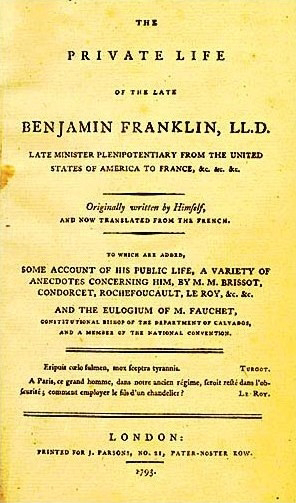"The Autobiography of Benjamin Franklin" is a seminal work, not only for its historical value but also for the depth of wisdom it contains.
"The Autobiography of Benjamin Franklin" is a seminal work, not only for its historical value but also for the depth of wisdom it contains. Franklin, one of the Founding Fathers of the United States, presents his life story as a template for self-improvement and personal success, underlining the importance of virtues such as industry, frugality, and integrity.
Franklin’s autobiography is more than a mere life story; it's a roadmap to living a life of virtue and achievement. His emphasis on self-education, self-examination, and the continual striving for moral perfection showcases his belief in the potential for individual improvement and the power of personal responsibility. Franklin's methodical approach to his virtues—carefully tracking his progress and setbacks—highlights his belief in the importance of habits in shaping one’s character and destiny.
One of the most profound aspects of Franklin's autobiography is his concept of moral perfection. Aware of his own flaws, Franklin nevertheless aspired to live a virtuous life, creating a list of 13 virtues he aimed to master. This endeavor reflects a deep philosophical understanding of human nature's complexities and the challenges inherent in self-improvement. His pragmatic approach to morality, emphasizing actionable steps rather than abstract ideals, makes his philosophy accessible and practical.
Franklin’s focus on the practical application of knowledge underscores his belief in the value of education for societal improvement. He was a polymath who contributed to fields as diverse as politics, science, and literature, demonstrating his belief in the power of knowledge to effect change. His inventions and scientific explorations, including his famous experiments with electricity, were driven by a desire to improve everyday life for the common good.
Moreover, Franklin's autobiography illustrates the importance of community and civic engagement. His efforts to establish public institutions, such as libraries, hospitals, and fire stations, reflect his commitment to societal welfare and his belief in collective action for the common good. Franklin’s life story encourages readers to contribute to their communities and to seek out ways to make a meaningful impact.
"The Autobiography of Benjamin Franklin" offers timeless wisdom on personal development, moral integrity, and civic responsibility. Franklin’s deep thoughts on self-improvement, community service, and the pursuit of knowledge resonate as much today as they did in the 18th century. His autobiography not only serves as a historical document but as a guide to living a life of virtue, wisdom, and public service.


